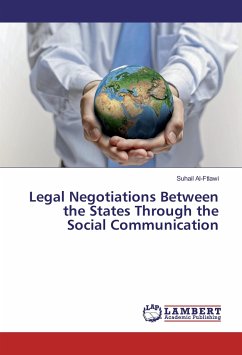
Legal Negotiations Between the States Through the Social Communication
Versandkostenfrei!
Versandfertig in 6-10 Tagen
24,99 €
inkl. MwSt.

PAYBACK Punkte
12 °P sammeln!
Some countries feel hesitant in conducting direct negotiations through social media due to the fact they can not use this means. On the other, some officials may hinder or limit negotiations since what they do does not achieve their good reputation through media. Moreover, social media contains a number of issues that relate to negotiations; some other countries may breach them as they have interests and work to hinder dispute settlement between the two disputing countries. The research assumes that the use of social media for the settlement of international disputes allows the senior leaders ...
Some countries feel hesitant in conducting direct negotiations through social media due to the fact they can not use this means. On the other, some officials may hinder or limit negotiations since what they do does not achieve their good reputation through media. Moreover, social media contains a number of issues that relate to negotiations; some other countries may breach them as they have interests and work to hinder dispute settlement between the two disputing countries. The research assumes that the use of social media for the settlement of international disputes allows the senior leaders to hold negotiations with/without the intervention of a third country and without personal obstacles, and without disagreement on the time and place of the direct negotiations, and allow them to make direct negotiations to avoid the disasters of wars.












